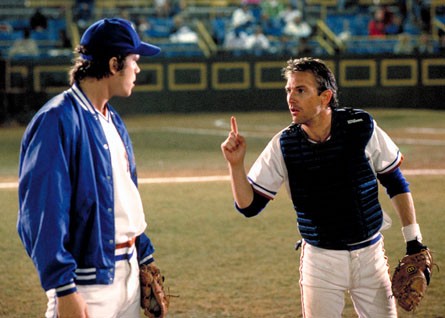.
BJOL has two intriguing remarks on the problem:
.
How accurately do you think the Red Sox (or teams in general) evaluate players' desire to get better before drafting? Is it harder or easier than evaluating physical skills? Do you think it is more or less important than physical skills in determining how good a player becomes?
Asked by: Ben from New York
Answered: 1/19/2016
Well, there's a lot of information about it. In baseball there certainly is such a thing as wanting it TOO MUCH, and you have to be careful about that. There's a lot of failure in baseball, a lot of losses and injuries and set backs and missed opportunities. The guys who want it TOO much can't handle the failures, and they'll burn themselves out.
We certainly pay a lot of attention to desire, and we discount the guys who are just coasting on ability, but sometimes you get burned by that, too; sometimes they just coast right on by the guys who are working hard. And "desire" isn't a constant. Ability isn't a constant, either, but desire is even less reliable than ability.
Khalil Greene, when he got to the majors, was famous as the player who just desperately wanted to be great. But after a couple of years, and he wasn't great, he just decided. . ."En, to blazes with it" and he just kind of quit. As Ron Swoboda once asked, "Why am I wasting so much dedication on such a mediocre career?"
.
.
Your comment about players' desire is interesting. It's especially fascinating how players can give up if they don't have the success they expect. It happens in real life all the time. Fans always talk about how players get lazy once they get a big contract. Do you think that's true? I have always believed just the opposite-that most players at the top professional levels are so motivated to succeed that they often try too hard to justify their contracts and their performance suffers. Maybe that's what happened to Melvin Upton. It seems to me that fans project their own expectations as to how they would behave if they got all that money, but I think professional athletes (at least those that make the majors) are much more akin psychologically to successful business people, e.g., Gates or Jobs, than they are to regular Joes.
Asked by: Marc Schneider
Answered: 1/20/2016
We get all kinds, but there are more highly motivated professionals than anything else. In the thirteen years I have been in Boston I guess we have had three players who basically conned us out of a contract and then showed up with no apparent desire to earn their money; can't give you names, obviously, but it does happen occasionally. None in the last five years.
Occasionally you get players who, after signing what they know is their last big contract, don't seem highly motivated, and are kind of just going through the motions. But MOST players. . .well, there are a million boys born every years who want to play major league baseball. One half of one percent of one percent will make it. It's hard to get into that one-half of one percent of one percent on talent alone. You've got to want it.
.
Bill doesn't mention Yoenis Cespedes, who hit .269/.296/.423 down the stretch for Boston (but who did not con them out of a contract). Cespedes spent 2015 batting .291/.328/.542 with 35 homers during his salary drive. Boy would I love to be the team that find out whether he's a makeup problem ...
Felix Hernandez 'conned' the M's out of a contract that is now 50 cents on the dollar. He gives you the impression that he might be slightly in that category, Wanting it too much.
Nelson Cruz didn't even get paid, relatively speaking. But to remember now the fear, that he would "stop roiding," is almost incredible.
Kyle Seager got paid, a big contract but one that would have Michael Bennett growling into his coffee every day, and has single-handedly condemned every con artist in baseball. Just though the way he lives his life.
Robinson Cano has battled through some injuries, and though he plays in such an unhurried, gliding style, draws no complaints over his screen drills or clubhouse presence.
Hisashi Iwakuma ... not to get all multi-cultural on you here, but how many of these NPB players come over here with anything less than a fine-tuned sporting disposition? The other island from which the MLB gets "isolated" players gives you almost the reverse. I wonder why that is. There's a KK in there somewhere. The Island of Dharma and the Island of Dr. Moreau. First guy to explain it gets flowers from Dr. D.
........
The Seahawks are probably in a different category. In football it's almost impossible to get too jacked up; you don't need the surgical precision to lay off a slider, unless maybe you're Russell Wilson. And it's easy enough just to weed out the guys who take downs off.
Maybe relief pitching, you can afford to go with the J.J. Putz heavy metal approach. Though Danny Hultzen doesn't really seem the type to benefit from a road rage mentality.
.........
Past M's: does it seem to anybody else that perhaps Dustin Ackley and Justin Smoak coulda been in that "want it too much" category? Might Zunino be a candidate for that review?
BABVA,
Dr D
